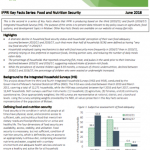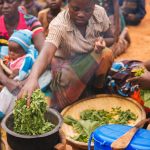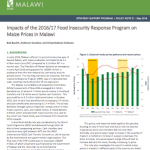[This blogpost was written by Catherine Ragasa and John Mazunda. It was originally published on the main IFPRI website.] Malawi’s agricultural policy is coming up short for farmers. While they receive heavy subsidies for seed and fertilizer, farmers continue to grapple with challenges to food security and productivity. Recent IFPRI research examines these gaps in Malawian agricultural policy, […]
Government of Malawi launches National Agriculture Investment Plan
(Post written by Paida Mpaso, communication specialist for NAPAS: Malawi, originally published on the Food Security Policy website.) On 13th June 2018, the Government of Malawi (GoM) through the Ministry of Agriculture, Irrigation and Water Development (MoAIWD) launched the National Agriculture Investment Plan (NAIP) after nearly two years of coordination and development, starting in September 2016. […]
Key Facts Sheet: Food and Nutrition Security
IFPRI Malawi is pleased to announce the publication of a "Key Facts Sheet: Food and Nutrition Security," the second in a series that began with the a fact sheet on agriculture. The series is being produced using the third and fourth Integrated Household Surveys (IHS), the latter of which was undertaken in 2016/17. The series aims to synthesize nationally […]
Nutrition-sensitive programs: How can they effectively tackle Malawi’s nutrition problems?
A solid case for nutrition-sensitive approaches Recent evidence from Malawi suggests that nutrition-sensitive interventions can and do work, and also that agriculture interventions can increase the production and consumption of nutritious foods. Evidence from other countries confirms the clear benefit of including strong behavior change communication (BCC), and also of integrating agricultural, child development, health, and […]
Policy Note 31: Impacts of the 2016/17 Food Insecurity Response Program on Maize Prices in Malawi
In early 2016, Malawi suffered its second consecutive year of harvest failure. An emergency was declared in April 2016 and the resulting humanitarian response, known as the Food Insecurity Response Program (FIRP), was of unprecedented scale: almost 40 percent of the population received in-kind food or cash transfers (or both) at an estimated cost of […]
- « Previous Page
- 1
- …
- 52
- 53
- 54
- 55
- 56
- …
- 69
- Next Page »





